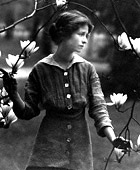Edna St Vincent Millay was born in Rockland, Maine on 22nd February, 1892. Cora St Vincent Millay raised Edna and her three sisters on her own after her husband left the family home. When Edna was twenty her poem, Renascence, was published in The Lyric Year. As a result of this poem Edna won a scholarship to Vassar.
In 1917, the year of her graduation, Millay published her first book, Renascence and Other Poems. After leaving Vassar she moved to New York's Greenwich Village where she befriended writers such as Floyd Dell, John Reed and Max Eastman. The three men were all involved in the left-wing journal, the Masses, and she joined in their campaign against USA involvement in the First World War.
Millay also joined the Provincetown Theatre Group. Others who wrote or acted for the group included Floyd Dell, Eugene O'Neill, John Reed, George Gig Cook, Susan Glaspell and Louise Bryant. Millay was considered a great success as Annabelle in Floyd Dell's The Angel Intrudes. In 1918 Millay directed and took the lead in her own play, The Princess Marries the Page. Later she directed her morality play, Two Slatterns and the King at Provincetown.
In 1920 Millay published a new volume of poems, A Few Figs from Thistles. This created considerable controversy as the poems dealt with issues such as female sexuality and feminism. Her next volume of poems, The Harp Weaver (1923), was awarded the Pulitzer Prize.
Millay married Eugen Boissevain, the widower of Inez Milholland, in 1923. Both were believers in free-love and it was agreed they should have an open marriage. Boissevain managed Millay's literary career and this included the highly popular readings of her work. In his autobiography, Homecoming (1933), Floyd Dell commented that he had "never heard poetry read so beautifully".
In 1927 joined with other artists such as John Dos Passos, Upton Sinclair, Dorothy Parker, Ben Shahn, Floyd Dell in the campaign against the proposed execution of Nicola Sacco and Bartolomeo Vanzetti. The day before the execution Millay was arrested at a demonstration in Boston for "sauntering and loitering" and carrying the placard "If These Men Are Executed, Justice is Dead in Massachusetts".
Later Millay was to write several poems about the the Sacco-Vanzetti Case. The most famous of these was Justice Denied in Massachusetts. Her next volume of poems, The Buck and the Snow (1928) included several others including Hangman's Oak, The Anguish, Wine from These Grapes and To Those Without Pity.
In 1931 Millay published, Fatal Interview (1931) a volume of 52 sonnets in celebration of a recent love affair. Edmund Wilson claimed the book contained some of the greatest poems of the 20th century. Others were more critical preferring the more political material that had appeared in The Buck and the Snow.
Her next volume of poems, Wine From These Grapes (1934) included the remarkable Conscientious Objector, a poem that expressed her strong views on pacifism. Huntsman, What Quarry? (1939) also dealt with political issues such as the Spanish Civil War and the growth of fascism.
During the Second World War Millay abandoned her pacifists views and wrote patriotic poems such as Not to be Spattered by His Blood (1941), Murder at Lidice (1942) and Poem and Prayer for an Invading Army (1944). Edna St Vincent Millay died in 1950. |






